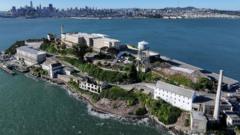US President Donald Trump's recent assertion to revive Alcatraz, the notorious prison island in San Francisco Bay, is raising eyebrows across expert communities. In his vision, Alcatraz could become a fitting deterrent for dangerous criminals and a strong symbol of law and order. However, many authorities question the practicality of such a venture given the prison's deteriorated state and historical significance.
Located just over a mile offshore from San Francisco, Alcatraz was a military prison before it evolved into a famous federal penitentiary in 1934. The likes of gangster Al Capone were housed there, contributing to its infamy. It has been closed since 1963, when federal costs of operating the facility ballooned to nearly three times that of typical institutions. Today, it is a beloved tourist destination, with 1.4 million annual visitors who come to learn about its storied past.
Trump's re-opening plan reflects a broader conversation about public safety and crime in America. In a post on social media in May, the President linked the idea to a growing frustration with crime, stating, "For too long America has been plagued by vicious, violent, and repeat criminal offenders." He characterized Alcatraz as embodying a strong message of authority.
Yet criticisms of the feasibility of the plan have been swift. Experts emphasize the extensive structural challenges that would need to be overcome. Hugh Hurwitz, former acting director of the Bureau of Prisons, bluntly noted, “To be frank, I thought it was a joke at first. You'd have to tear it up and start over.” Concerns include decaying buildings, inadequate safety measures, and outdated infrastructure — notable even to those familiar with its legacy.
Jolene Babyak, an Alcatraz historian, echoed these concerns, elaborating on the unsustainable waste management practices from the time it was operational. “In its heyday, sewage for over 500 inmates was dumped directly into the bay,” Babyak commented, calling into question the environmental and logistical viability of reopening the facility.
Critics have also pointed out that although Trump’s comments capture public imagination, the practicalities are formidable. Operational costs for federal prisons have escalated over the years, and with essential services like electricity and sanitation lacking at Alcatraz, logistics present overwhelming doubts on the plan's success.
As discourse around crime continues to shape political agendas in America, the idea of Alcatraz’s reopening remains, for now, a conversation of both historical reverence and modern-day practicality, with little sign of shifting towards reality. The future of this ill-fated proposal ultimately lies in the intersection of community aspirations and logistical realities.



















